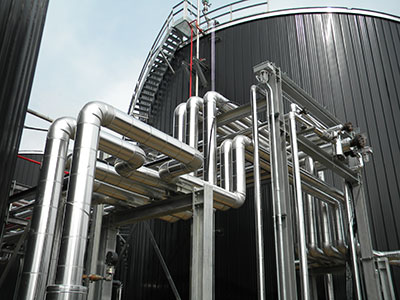Cellular glass insulation can help reduce heat loss and protect tanks from temperature extremes, but many people are unclear if it works for hot or cold conditions.
Cellular glass insulation works for both hot and cold applications, making it suitable for protecting cryogenic tanks and high-temperature tanks in industrial settings.
I often get asked whether cellular glass insulation is designed only for cold tanks or just for hot tanks. Many plant engineers, like Hans Müller from chemical facilities in Germany, need an insulation material that covers both ends of the temperature spectrum. The good news is that cellular glass works exceptionally well for both cryogenic temperatures and high heat, making it an all-in-one solution. If you are balancing different tank requirements at your site, cellular glass will meet both needs. Let me explain why this material handles extremes so well.
What is the temperature range for cellular glass insulation?
Cellular glass insulation is trusted in industrial projects because it works for extremely cold storage and very hot pipes and tanks.
Cellular glass insulation can handle temperatures from as low as -268°C up to +430°C. This range means you can use it on tanks and pipes that deal with both freezing cold and intense heat, without worrying about insulation breakdown or loss of performance.

When I speak to clients about insulation, the temperature range is always a priority. Some materials fail when exposed to either deep cold or high heat, leaving tanks at risk. Cellular glass resists problems that affect other materials, such as cracking at low temperatures or sagging and deteriorating when exposed to heat. From storing chemicals below freezing all the way to steam lines in demanding chemical facilities, cellular glass offers stability.
I have seen chemical plants in Europe use cellular glass from their cold storage tanks to their most extreme heating systems. The closed-cell structure stops heat from passing through and protects against sudden changes in temperature. It also prevents water from getting in, eliminating condensation or corrosion on cold tanks. Engineers like Hans prefer cellular glass because it handles every challenge, maintains insulation quality for decades, and keeps costly maintenance problems away. From one end of the temperature scale to the other, it simply works.
What type of insulation is cellular glass?
Cellular glass is a rigid insulation material, made from processed glass and formed into millions of microscopic closed cells that block heat and water.
Cellular glass is a tough, solid insulation product made by heating crushed glass until it expands into a block full of tiny air bubbles. These bubbles trap heat and stop water from getting inside, so the insulation stays strong for years.

When I help customers pick insulation, I always look for something that will survive tough conditions. Cellular glass stands out because no water can get in. It is entirely closed-cell, so it does not rot, degrade, or let moisture through. Other materials, like glass wool and rubber foam, can soak up water from leaks or condensation and lose effectiveness. In harsh plant settings, cellular glass stays dry and rigid, maintaining its performance and safety over time.
Engineers such as Hans Müller look for durability, not just thermal properties. Cellular glass keeps its original shape and insulation value, whether the tank is freezing cold or boiling hot. It never absorbs water, so there is no risk of corrosion under insulation (CUI). It does not break down with age or exposure. If you need insulation that lasts, blocks water, and stays powerful, cellular glass is simply the best choice for heavy-duty projects.
Is cellular glass insulation fireproof?
Cellular glass insulation is known to be noncombustible and fireproof, making it a safe choice for tanks and pipework exposed to high temperatures.
Cellular glass insulation does not burn, create smoke, or melt during fire. Its pure glass base is completely fireproof, passing the strictest fire safety standards in industrial use.

Fire safety is always a key concern when working with tanks filled with chemicals or running next to electrical systems. Cellular glass offers strong peace of mind for plant engineers because it will not ignite, burn, or smoke even under direct flame. There are no plastic binders or organic material that can add to fire risk. This makes cellular glass a top choice for tanks with flammable contents or where regulations demand the highest fire safety ratings.
Hans Müller knows that the cost of a single fire event can be enormous. Cellular glass helps prevent disaster. It does not burn or give off dangerous fumes. Under extreme heat, cellular glass remains unchanged and does not contribute to fire spread. For any facility needing absolute fire protection in its insulation, cellular glass is the material I always recommend first.
Conclusion
Cellular glass insulation works for both extreme cold and intense heat, is tough and fireproof, and remains reliable for long-term use on industrial tanks.

